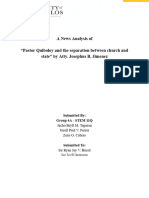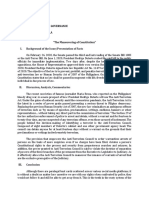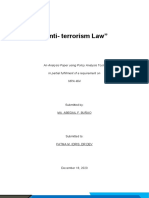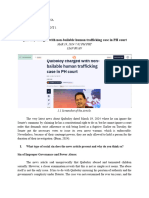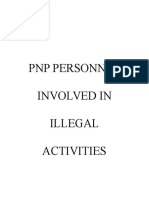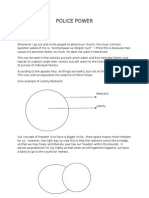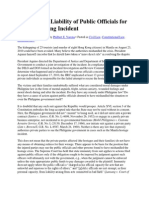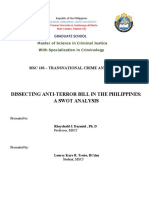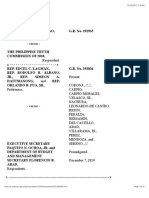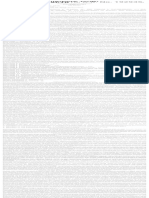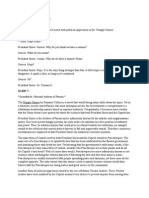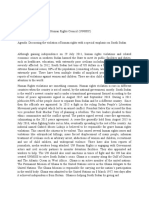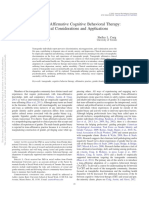TOPIC : The Philippine National Police should be held liable for the gross abuse of power in
the enforcement of arrest against Apollo Quiboloy.
NEGATIVE DEFENSE
PRACTICABILITY:
It may not be practical to hold the PNP liable for gross abuse of power in the enforcement
of the arrest against Apollo Quiboloy. The combination of political influence,
institutional loyalty, challenges in gathering evidence, and a slow legal system
makes it difficult to pursue accountability in a meaningful way.
Even if abuse of power occurred, the legal and systemic barriers may prevent the PNP from
being held responsible, especially in a high-profile case involving a figure like Quiboloy.
1. Political Influence and Connections
Apollo Quiboloy is a highly influential religious leader with strong political ties,
particularly with former President Rodrigo Duterte. His close relationship with
powerful figures in the government could create a reluctance or hesitation within
the law enforcement and justice systems to pursue any claims of abuse of power by
the PNP.
The PNP, being a government institution, might avoid actions that could lead to
political backlash or interfere with political alliances. In cases involving high-
profile individuals, it is common for investigations or accountability measures to be
stalled or undermined due to political considerations.
https://www.philstar.com/the-freeman/opinion/2024/03/11/2339720/politics-ethics-
and-quiboloy
�2. Institutional Loyalty and Lack of Independence
The PNP’s chain of command is hierarchical and often influenced by the executive
branch of government. Given the lack of complete independence from political
leaders, internal investigations into alleged abuses might not be pursued thoroughly,
especially when the case involves a figure like Quiboloy, who has political allies in
powerful positions.
There may also be an element of institutional protection where the PNP may not
want to admit fault or hold its officers accountable, particularly if the arrest was
perceived as aligned with government interests.
3. Public Perception and Media Framing
In cases involving public figures like Quiboloy, the media narrative and public
perception can shape the direction of any legal or accountability processes. If the
arrest is framed as part of a larger political or religious conflict, there could be
diminished public support for holding the PNP accountable.
Additionally, if the public views the arrest as justified, any claims of abuse of power
may be seen as less significant, reducing the pressure on authorities to take action.
4. Challenges in Proving Gross Abuse of Power
Holding the PNP liable for gross abuse of power would require clear,
substantial evidence that their actions during the arrest were excessive,
unlawful, or in violation of rights. In many cases, proving such abuses,
particularly in high-profile arrests, can be difficult. The burden of proof lies on the
accusers, and unless there is strong documentation, testimonies, or independent
investigations, it may be hard to establish liability.
Additionally, the PNP could justify their actions under the umbrella of standard
operating procedures or claim they were following legal orders, making it harder
to prove abuse of power in court. Presumption of Regularity in the performance
of official duty
4.a. THE PRESUMPTION OF REGULARITY OF PERFORMANCE OF OFFICIAL
DUTY
This stands only when no reason exists in the records by which to doubt the
regularity of the performance of official duty. In many cases, the court decides that
the presumption of regularity of the performance of official duty in favor of the
arresting officers cannot prevail over the presumption of innocence in favor of
the accused. (Philippines, Vs. Jehar Reyes)
5. Slow and Inefficient Legal System
The Philippine justice system is often criticized for being slow, bureaucratic, and
prone to delays. Even if there were grounds to hold the PNP liable, pursuing legal
cases against law enforcement officials can take years, and in some cases, justice
� may never be fully realized. This inefficiency discourages many from pursuing such
cases.
High-profile individuals often have access to strong legal teams and can use legal
maneuvering to prolong or derail accountability efforts.
6. Lack of Strong Accountability Mechanisms
While the PNP has internal accountability mechanisms (such as the Internal
Affairs Service), these mechanisms are often perceived as weak or ineffective,
particularly when it comes to cases involving politically sensitive figures. There may
be limited transparency in how investigations are conducted, and penalties (if
any) may be minor.
External oversight bodies like the Commission on Human Rights (CHR) can
investigate, but their findings often rely on cooperation from law enforcement
agencies, which can be challenging to obtain.
CHARGES AGAINST APOLLO QUIBOLOY:
SEXUAL ABUSE AND COERCION
Quiboloy, and his associates, were accused of sexually exploiting women and underage
girls, under the pretence of religious duty.
The indictment alleged they recruited females aged 12 to 25 as personal assistants, or
"pastorals." It said they had been required to prepare Quiboloy's meals, clean his
residences, give him massages, and travel with him.
The pastorals were coerced to have sex with Quiboloy during what they called "night duty,"
under the threat of "eternal damnation" and physical abuse, according to the indictment.
TRAFFICKING
The indictment also accused Quiboloy and others of participating in a labour trafficking
scheme that exploited church members, forcing them into sham marriages and fraudulently
obtaining visas to allow them to stay in the U.S. to solicit money.
Church members were ordered to inform the public that the donations would help
impoverished children, when in fact the money directly financed KOJC operations and the
lavish lifestyle of KOJC leaders.
MONEY LAUNDERING
The indictment also charged bulk cash smuggling and money laundering, alleging that
funds were illegally sent back to the Philippines through various means, such as church
workers carrying $9,000 in cash hidden in socks and luggage when they returned to
Manila.
https://www.reuters.com/world/asia-pacific/key-charges-against-philippines-appointed-son-
god-apollo-quiboloy-2024-09-11/#:~:text=In%202021%2C%20a%20U.S.%20federal,fraud
%2C%20coercion%20and%20money%20laundering.
Given the serious nature of the charges against Apollo Quiboloy, including those under the
Special Protection of Children Against Abuse, Exploitation, and Discrimination Act, as well
�as the qualified human trafficking charge, the actions of the Philippine National Police
(PNP) in enforcing the arrest become particularly significant.
If the PNP is found to have acted unlawfully or excessively during the arrest
process, it could raise questions about their accountability.
Key Considerations:
DUE PROCESS AND LEGAL STANDARDS
The PNP is expected to follow due process and the rule of law when enforcing an arrest.
This includes having a valid warrant (if required) and following procedures laid out in the
Philippine Constitution and other relevant laws.
If the PNP violated Quiboloy’s rights or abused their power by using excessive force, illegal
detention, or other forms of misconduct, they could indeed be held accountable.
HUMAN RIGHTS VIOLATIONS
If the PNP is found to have committed any human rights violations during the arrest (such
as unwarranted violence or mistreatment), they could be held liable through internal
disciplinary measures, civil lawsuits, or even criminal charges.
The Commission on Human Rights (CHR), an independent body, often investigates
allegations of abuse by law enforcement to ensure accountability.
PUBLIC SCRUTINY AND POLITICAL INFLUENCE
Given Quiboloy’s position and connections to powerful political figures, any actions by the
PNP could be viewed under a lens of political bias or influence. If there is a perception that
the PNP was acting under political pressure or inappropriately favoring one side, this could
lead to calls for an investigation or charges of abuse of power.
INTERNATIONAL CONSIDERATIONS
Quiboloy is also facing legal challenges in the United States, including charges related to
human trafficking and fraud. The extradition process and the PNP’s role in his arrest could
also be scrutinized to ensure compliance with international legal norms and treaty
obligations.
LIABILITY OF THE PNP:
The PNP can be held liable for gross abuse of power if any of the following occur:
- EXCESSIVE USE OF FORCE
If the arrest involved unjustified force or violence, it could constitute an abuse of
power.
- VIOLATION OF QUIBOLOY’S RIGHTS
Arresting someone without respecting their basic rights, such as their right to legal
representation, or failure to follow legal procedures, could be grounds for liability.
- UNLAWFUL DETENTION
If Quiboloy was detained without proper legal basis, this could be considered
unlawful and an abuse of authority.
�SUMMARY
whether the PNP should be held liable for gross abuse of power in Quiboloy’s
arrest would depend on a detailed investigation into the circumstances.
If any illegal or excessive actions were taken, accountability mechanisms, including legal
proceedings or internal investigations, should follow to ensure justice and uphold the rule
of law.

